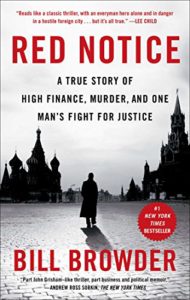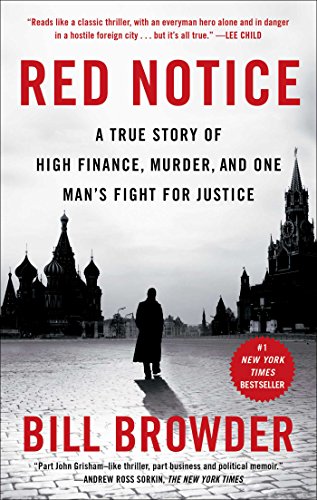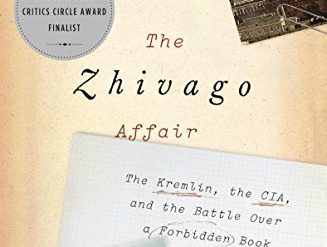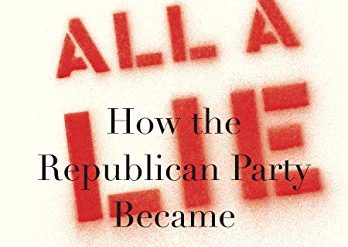
Even if you follow international news only casually, you’re likely to be aware that Putin’s Russia is a kleptocracy. Two dozen oligarchs effectively run the country. Some, including President Vladimir Putin himself, hold government office. Others are private “bankers” and “businessmen.” Together, they have looted hundreds of billions of dollars, plundering Russia’s oil and gas reserves and buying up government enterprises at pennies on the dollar in a corrupt process of privatization.
The truth about Putin’s Russia
Putin alone is reported to have amassed a fortune of at least $40 billion. Other observers consider him the richest man in the world, with assets totaling more than $100 billion. Though from time to time we’ve also read reports about the murder of whistle-blowers, investigative journalists, and opposition politicians, these fragmentary reports don’t make clear just ruthless and brazen the rulers of Putin’s Russia have shown themselves to be
Russian-American journalist Masha Geffen’s expose, The Man Without a Face, gave us insight into the rise of Putin himself. Now comes Red Notice, Bill Browder‘s lucid memoir of nearly two decades’ involvement in the Russian financial markets. Through painful personal experience, Browder bore witness to the violence and other criminal behavior that built the great fortunes at the top of Russia’s economic pyramid today.
Red Notice: A True Story of High Finance, Murder, and One Man’s Fight for Justice by Bill Browder (2015) 417 pages ★★★★★
An investment adviser turns civil rights activist
Red Notice encompasses two stories. First is the remarkable tale of how Browder made a fortune through investments in Russia in the 1990s and early 2000s. Second is the story of how quickly his business, his life, and his colleagues’ lives began falling apart once Browder ran afoul of Vladimir Putin. He began his career as an investment adviser. He ended it as a civil rights activist.
Browder is a remarkable figure in his own right. His grandfather was Earl Browder, who headed the US Communist Party during the 1930s and 40s and twice ran for President on its ticket. Other members of his family, including his father, two uncles, and his brother, are not just progressive politically but prodigies in science and math as well. They hold distinguished professorships in their fields at top universities. (“In my family,” Browder writes, “if you weren’t a prodigy, then you had no place on earth.”) Bill Browder himself rebelled against his family from an early age, resolving to do the one thing that would most upset his family: become a capitalist. And so he did, earning an MBA from Stanford and going to work for the investment bank Salomon Brothers and later as a consultant with the Boston Consulting Group.
Making billions from privatization
Browder’s interest in Eastern Europe soon got him involved in some of the very first privatizations in that region. Later, having proven his ability to pick wise investments in Poland and elsewhere in the region, he founded his own firm in Moscow, Hermitage Capital Management. With substantial funds from Israeli and American investors, Browder quickly built Hermitage into “the best-performing emerging-markets fund in the world” in 2000. By the early years of this century, the firm held $4.5 billion in assets. It had been started only in 1996 with $25 million. Browder made all this money taking great risks with large investments in what appeared to be sure-fire 50- or 100-to-1 payoffs as the Russian privatization program proceeded. He turned out to be right again and again.
This process of privatization lay the foundation for many of today’s great fortunes in Russia. “Instead of 150 million Russians sharing the spoils of mass privatization,” which had been the alleged purpose of the program, “Russia wound up with twenty-two oligarchs owning 39 percent of the economy and everyone else living in poverty. . . [B]y the year 2000 the richest person had become 250,000 times richer than the poorest person.” This is not the way business works in most of the rest of the world. It’s criminality, pure and simple. It may be unkind to point out that Browder might well have been one of these oligarchs had he been Russian. The fortune he built was considerable.
From Putin’s favor to criminal charges
Once Browder ran afoul of Putin and his cronies, the full might of the Russian government began mobilizing to ruin him. Police official raided not just his offices but those of his lawyers as well on the basis of trumped-up charges. Criminals literally stole three of his companies by forging documents and filing them in obscure provincial courts. Bogus complaints were lodged against Browder and his lawyers for tax evasion, beginning a years-long saga which ended when criminals engineered the theft of $230 million from the Russian government—the same amount Browder’s firm had actually paid in taxes!
But all this legal maneuvering was only the beginning. During these times, Browder successfully moved all his assets out of Russia and out of reach. When the criminals realized there was nothing to steal, the threats escalated. Browder then managed to extract two of his principal lawyers from the country before they could be jailed and tortured. A third, Sergei Magnitsky, was not so lucky.
Much of Red Notice is about Bill Browder’s years-long effort to gain Magnitsky’s freedom. When he failed, and Magnitsky eventually died before the age of 40 from torture, medical neglect, and a vicious beating by guards when he was deathly ill, Browder became virtually a full-time civil rights activist. It was in large part through his efforts that the US government eventually took action against the 60 individuals who had taken part in the illegal jailing, torture, medical neglect, and murder of Sergei Magnitsky. With help from several remarkable government officials, he even managed to persuade a very reluctant Obama Administration to issue sanctions personally directed at the 60. Their vehicle was the Magnitsky Act of 2012, which Browder was instrumental in passing. It’s a truly moving and remarkable tale.
For related reading
Click here for more Good books about Vladimir Putin, modern Russia and the Russian oligarchy.
Also, this book is one of Two dozen excellent memoirs. And you might enjoy Great biographies I’ve reviewed: my 10 favorites.
Like to read books about politics and current affairs? Check out Top 10 nonfiction books about politics.
And you can always find my most popular reviews, and the most recent ones, on the Home Page.


























